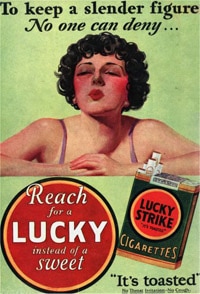
Credit: Body Health Wellness
Recently, I came across this gem of a post about the history of antiperspirant and deodorant.
You see, as recently as the early 1900′s, Americans weren’t too worried about sweaty or smelly underarms. In this time before air conditioning, when people often wore a lot more clothing than we do, even in the summer, sweaty and smelly underarms weren’t really a concern. In fact, the word “underarm” wasn’t really a word until advertisers needed a nicer-sounding euphemism for armpit.
So why did things change? Why did so many Americans start buying antiperspirant and deodorant, so that it’s now an 18-billion-dollar-a-year industry?
It’s very simple. Advertisers made up a problem. They convinced women that their odoriferous underarms were the reason they weren’t getting dates. They convinced men that their smelly pits were unmanly and the reason why they weren’t climbing the corporate ladder.
And the big capper: They convinced people that using this stuff was healthy. They made antiperspirants and deodorants so normal that they became a regular part of the ritual of puberty.
Sound familiar?
The history of dieting is a fairly similar tale. It may have started earlier and had different players, but there are certain tropes in this story that bear a similar stink.
Those Who Do Not Know Dieting’s Past Are Condemned To Repeatedly Diet
There was actually a time, even here in America, when fatness wasn’t considered a problem.
Until the early 20th century, doctors were mostly concerned with their patients’ weight when they were noticeably losing weight. Sudden weight loss could indicate a dangerous wasting disease, like tuberculosis.
Two of the earliest dieting advocates, William Banting and Helen Densmore, had to convince people that fatness was a really bad thing, bad enough that you should buy their pamphlets, follow their meal plans, and take their “morning cordial” (Banting) or weight loss tea (Densmore) — both of which contained laxatives.
Both of these diet marketers conflated fat with ugliness and immorality. Their diets were proscriptive and plainly dangerous, with Densmore actually telling people to fast for as long as 30 days if her diet didn’t work.
The genius of obesity epidemic rhetoric is that it takes this normal thing — bodily diversity — and pathologizes it.
Just like anti-perspirant marketers had to convince people that underarm sweat and smell is disgusting and will keep you from getting dates and jobs, diet marketers had to convince people that fat was disgusting and would keep you from getting dates and jobs.
They keyed in to people’s deepest fears of social ostracism and inability to support themselves and made scads of money in the process.
Fast forward through about 100 years of diets, from Horace Fletcher’s chewing diet, to the tapeworm diet (I wish I was kidding) to the Master Cleanse (yes, that’s a diet, let’s get real here) to the Nicotine Diet to the Cabbage Diet, to the HCG diet (it’s from the 60′s and it’s still a bad idea, by the way) to all the “lifestyle plans” (Weight Watchers, Jenny Craig, etc.) and what do you have?
A society convinced that fat is bad and that dieting is the answer.
Not only do they “know” that fat is bad and dieting is good, but they are convinced that the fact that dieting only worked in the short term is their fault. That really is brilliant marketing.
This Time, I’m Doing It For My Health!
Promoters of anti-perspirants also had to spend a lot of time and money convincing people that their product was healthy. Quite naturally, people were dubious of a product that blocked the natural cooling and excretion process of sweating.
Nowadays, very few people worry about this problem (except for folks like me who use stuff like this), just like very few people seem concerned about the negative effects of diets, diet products, and weight loss surgery.
In the early 1990′s, more researchers were getting hip to the reality that the vast majority of human beings were incapable of sustained weight loss, and that these attempts to lose weight were causing more problems than they were solving.
As you can imagine, the multi-billion-dollar diet industry was not cool with this reality. So they made sure to fund their own weight loss “research” that would lead to the conclusions that they needed to keep marketing weight loss. And it worked.
These conclusions get repeated so often that they are now believed to be “common sense” — fat is unhealthy and weight loss is healthy. Any attempts to lose weight — be they diet pills, fake fats, fake sugars, weight loss surgery, or good ole dieting — are healthier than OMG just being fat.
If you think about it, the problem of “obesity” is a marketer’s dream. Despite the rhetoric, it doesn’t actually kill anybody, so the diet industry has a lifelong customer. There’s no cure for it, and the supposed cure (dieting or weight loss surgery) causes a variety of problems, including weight gain, which just keeps the customer hooked in.
Plus, lots of folks who aren’t fat are convinced that they’re fat or going to become fat, so they buy the product as well. This is marketing heaven!
Don’t Believe the Hype and Further Reading on the History of Diets
I hope I’ve demonstrated here that our collective beliefs about fat and weight loss are utterly fabricated and meant only to sell products. It’s time to investigate these beliefs and give our bodies (including our underarms) a break!
If you find the history of dieting as horrific and fascinating as I do, check out these wonderful books!
- Losing It: False Hopes and Fat Profits in the Diet Industry by Laura Fraser
- Fat Shame: Stigma and the Fat Body in American Culture by Amy Erdman Farrell
- Talking Fat: Health Vs. Persuasion in the War on Our Bodies by Lonie McMichael
- The Obesity Myth: Why America’s Obsession With Weight Is Hazardous To Your Healthby Paul Campos
And for a quick hit of facts about fat, check out this post.
Want to discuss this further? Login to our online forum and start a post! If you’re not already registered as a forum user, please register first here.
Originally posted on Body Love Wellness and cross-posted here with their permission.
Golda Poretsky is a Contributing Writer for Everyday Feminism. She’s a certified holistic health counselor and founder of Body Love Wellness, a program designed for plus-sized women who are fed up with dieting and want support to stop obsessing about food and weight. Learn more about Golda and her work at www.bodylovewellness.com and book her for speaking engagements. Follow her on Twitter at @bodylovewellnes.
Search our 3000+ articles!
Read our articles about:
Our online racial justice training
Used by hundreds of universities, non-profits, and businesses.
Click to learn more




















